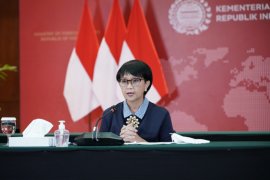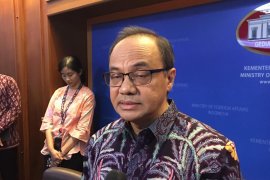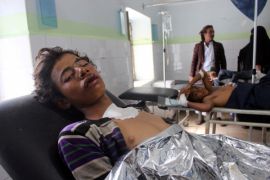Protesters have rejected the proposal made by foreign ministers of the Gulf Cooperation Council, saying they wanted the fall of Saleh`s regime altogether and insisting that Yemen`s strongman should also be tried.
"In compliance with statements (he) made several times... his excellency the president has no reservation against transferring power peacefully and smoothly within the framework of the constitution," said a statement issued by Saleh`s office.
The statement said that the Yemeni president again "welcomes efforts exerted by brothers in the Gulf Cooperation Council to help in finding a solution for the current crisis in Yemen."
But it fell short of saying clearly whether he accepted a direct GCC proposal calling on Saleh to ensure a peaceful transition of power to his deputy, Abdrabuh Mansur Hadi.
"The Yemeni Republic stresses that it will deal positively with the (GCC) statement as a base for dialogue," said the statement, which came a day after a meeting of GCC foreign ministers in Riyadh.
Saleh, who has been in power since 1978 and faces fierce protests demanding his departure since late January, on Friday rejected such a proposal for his exit made by Qatar`s prime minister as a "blatant interference in Yemeni affairs."
His defiant statement came after Qatari Prime Minister Hamad bin Jassem al-Thani had said that the GCC member countries "hope to reach a deal with the Yemeni president to step down."
Yemen, an impoverished neighbour of the GCC, recalled its ambassador to Doha in protest.
Leading Common Forum opposition activist Mohammed al-Sabri accused Saleh of trying to buy time.
"This is manipulation and time-buying" move, he told AFP.
The Common Forum has welcomed the GCC offer which is almost a copy of a vision it offered to Saleh last week, urging him to step down and pass power to his Hadi, who is a member of the ruling General People`s Congress party.
"We welcome the results of the GCC ministerial meeting," Mohammed Qahtan, the spokesman of the Common Forum, said on Monday.
But later he told AFP that the opposition wanted to see the official text of the proposal made on Sunday before making a final decision, pointing out to a possible difference in the wording from the earlier proposal.
"We had welcomed the first (version), while we will announce our position regarding the second one. We stick to the first initiative," he said. The opposition says the proposal calls for Saleh to step down.
"The Common Forum has not made its decision yet," he added.
Sabri was more clear, claiming that the first offer "stipulated the immediate departure (of Saleh) from power... while the second speaks of passing authorities" of the president to his deputy.
The coalition groups several opposition parties, including Islamists and leftists. But its leaders have said repeatedly that they do not have control over the protesters.
The anti-regime protest movement rejected Monday the Gulf proposal, an offer welcomed by the mainstream opposition.
"We are not concerned by any solution negotiated between the regime and the opposition that does not answer our main demand: the fall of the regime and its figures," said leading activist Adel al-Rabyi, from the Youth for Change coalition of protest groups that have led demonstrations across the country since late January.
"We do not accept the hijacking of our revolution," said Rabyi, who insisted that he spoke on behalf of all youth groups in Sanaa and other major cities hit by protests.
Thousands of protesters headed Monday from Sanaa`s University Square, dubbed as Change Square after protests, to the residence of Saleh`s deputy, Hadi, according to an AFP journalist.
"The people want to put the president on trial," they chanted.
Another protest broke out in the Red Sea city of Hudaydah demanding the immediate ouster of Saleh and also called for the president to be put on trial, organisers said.
More than 125 people have been killed since protests began in January, inspired by successful uprisings that toppled long-time rulers in Tunisia and Egypt. (*)
Editor: Kunto Wibisono
Copyright © ANTARA 2011










